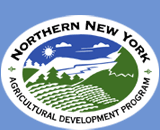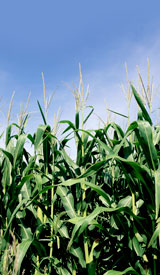

Northern New York Agricultural Development Program Press
Releases
November 30, 2005
Contact: NNYADP Co-Chairs: Jon Greenwood, 315-386-3231, Joe Giroux, 518-563-7523; Dr. Quirine Ketterings, Cornell University, 607-255-3061;
qmk2@cornell.edu
New Farm Environmental Management Research Posted on NNY Agricultural Development Program Website
New research updates on how farms can improve farm profitability while protecting the environment are now online at www.nnyagdev.org. A Cornell research team working with Northern New York farmers has issued annual reports on �Best Management Practices for the Use of Dairy Manure: Towards Calibration of the Phosphorus Runoff Index in Northern NY,� and �Whole Farm Nutrient Balances for NNY Dairy Farms: Basis for Environmentally Sound Nutrient Management.�
�Environmental regulations, high fertilizer prices, improved manure handling and storage technologies, and steadily increasing animal densities on farms have forced us to re-examine whole farm nutrient management,� says research team leader Dr. Quirine M. Ketterings, Assistant Professor, Nutrient Management Spear Program, Department of Crop and Soil Sciences, Cornell University.
The Whole Farm Nutrient Balance project provides an assessment of the current status of nitrogen, phosphorus and potassium balances for eleven Northern New York farms that participated in the research study this year. This assessment, conducted in collaboration with Cornell Cooperative Extension and the Miner Institute, helps build the database necessary for improving understanding of the causes of nutrient imbalances and for developing best management practices that allow for more efficient nutrient use across the farm.
�Sustaining or increasing crop yields while minimizing the potential for nutrient loss to the environment requires the development of management options that address nutrient use efficiency across the farm,� Dr. Ketterings adds.
The Northern New York Agricultural Development Program and the Cornell University Agricultural Experiment Station provided funding for this research.
For more information, click here to
view the Agricultural Environmental Management section of the Research Report Archives or contact your local Cornell Cooperative Extension office.
